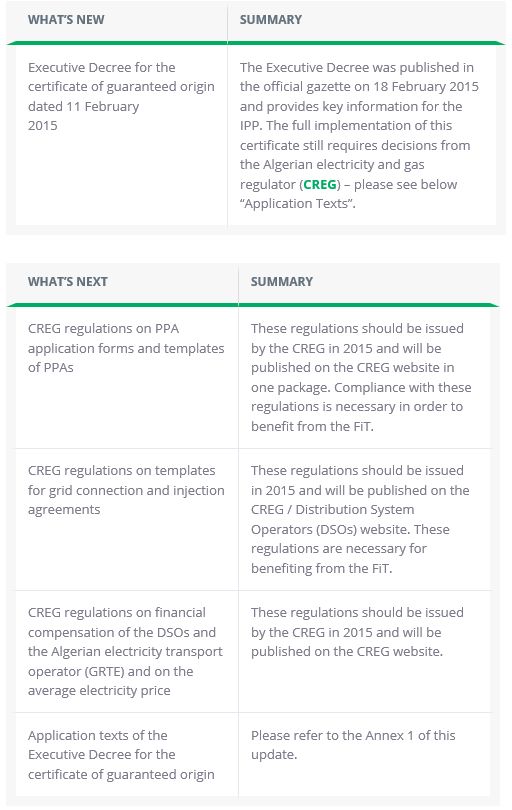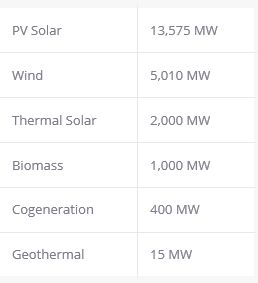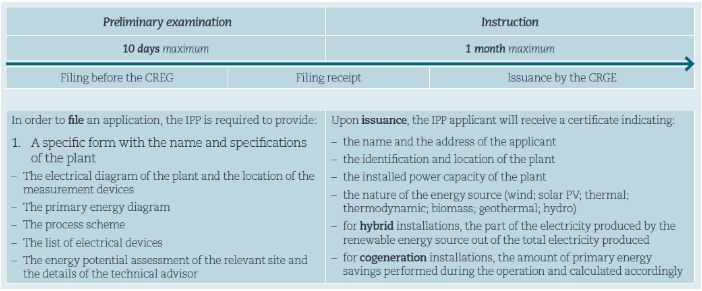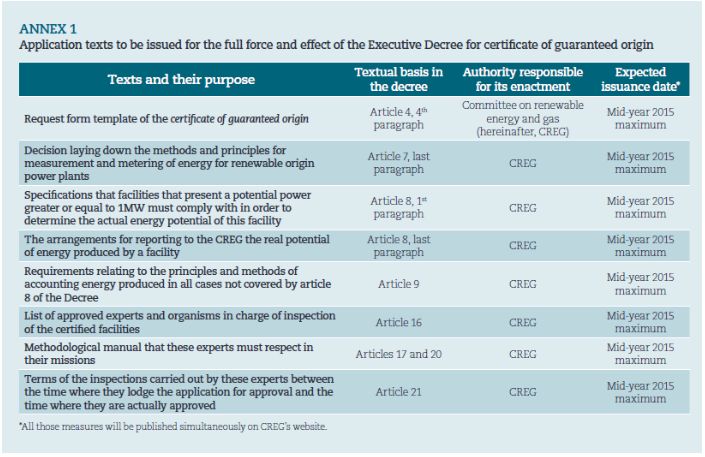As expected, Algeria has stepped forward towards the consolidation of the renewable energy regulatory framework, by enacting and publishing the Executive Decree for the certificate of guaranteed origin.
This set out the administrative framework of the certificate of guaranteed origin as well as the rights and obligations of the independent power producers (IPPs) benefiting from the Algerian feed-in tariffs (FiT), notably in terms of technical and administrative inspections.
For your recall, the certificate of guaranteed origin is a pre-condition to benefit from the FiT under the power purchase agreements (PPA) (today, the only FiT in force is for solar PV and wind). As we discuss below, the Executive Decree still requires the issuance of several application texts to be in full force and effect (please refer to Annex 1 of this update for the main application texts to be issued).
It is worth noting that over the first months of 2015, the Government of Algeria has taken political steps in promoting renewable energy in the global context of falling oil prices: the elevation of the national objectives for renewable energy, the merge of the national fund for energy savings and the funds for renewable energy and cogeneration (and a subsequent increase of its financial capacities), a new Ministerial Order for the operation and maintenance of the Algerian transport electricity grid and a new Executive Decree for the instruction and granting of building permits.
Status of the Algerian regulatory framework for renewable energy

- Elevation of the national renewable energy objectives in light of the low oil prices
The Algerian national objectives for renewable energy have been updated and elevated. Although the global objective remains at 22 GW of installed power capacity for the period 2015 - 2030, the objectives have been elevated from 3 GW to 4.5 GW, expected to be achieved by 2020. This should provide 27% of Algeria's total electricity production1 instead of 20% as initially planned.
According to the public statement made by the Ministry of Energy, the updated renewable energy objectives are as follows:

Even if, from a general standpoint, low oil prices have a very limited impact on investments in proven renewable technologies in the MENA region (mainly solar PV and wind – please refer to the recent Clyde & Co article 'Impacts on the MENA renewable and petrochemical market' dated 31 March 2015), the impacts for Algeria deserve a specific analysis.
Oil revenues in Algeria contribute to an important social and political role, and their substantial fall since the end of 2014 (for Algerian oil outside revenues, from USD 62.95 billion in 2014 to an expected level of USD 48.9 billion for 2015) shall not call into question the implementation of the national renewable energy objectives by Algerian government, but shall rather delay the investments in the renewables energy field.
Additionally, one might explain that delays in the effectiveness of the Algerian renewable energy objectives seem also justified by the slow development and consolidation of the Algerian renewable energy industry, based on partnerships with foreign manufacturers (General Electric, Yingli Green Energy for example, etc.), who do not currently seem ready to massively contribute to the Algerian renewable energy objectives.
In order to compensate such delays, the CEO of Sonelgaz has recently called for an increase of the electricity retail price on consumers (radio statement on 21 April 2015). Nevertheless, such solutions remain very difficult to implement to date considering the current social tensions in Algeria and the buying power of the Algerian households.
- Application of the Executive Decree for the certificate of guaranteed origin
The Executive Decree for the certificate of guaranteed origin sets out both the administrative modalities for the application, instruction and granting of certificate, and the devices and inspection requirements to be borne by the IPP. The certificate of guaranteed origin can be modified, suspended and withdrawn by the CREG. As the certificate of guaranteed origin shall not be published, it shall not be challenged before the administrative court by a third-party.
The certificate of guaranteed origin is a key permit in renewable project development as it constitutes one of the first authorisations to be obtained in order to apply for the PPA to be implemented with existing FiTs.
(i) Application process and timeframe:

THE CREG IS YET TO PUBLISH THE APPLICATION FORM FOR THE CERTIFICATE.
(ii) Monitoring devices and inspections of the plant
The Executive Decree provides that the IPP will be (i) required to install several devices to count and monitor energy levels and (ii) subject to technical and administrative controls prior to commissioning the plant and during its operational life-time.
- Installation of devices: In order to benefit from the FiT, the certificate of guaranteed origin requires the installation of specific electrical equipment by the IPP:
- The IPP will be required to install electricity counting devices in the plant. These systems shall comply with the CREG's requirements which are not yet available and those listed in Law No. 90-18 dated 31 July 1990 relating to the national system of metrology;
- For power plants with an installed power capacity greater than 1MW, the IPP is required to install devices and software to measure the solar energy potential on-site during the operational life of the plant, at its own costs. These devices and software have to comply with the specifications to be provided by the CREG however these are not yet available. This data will be provided to the CREG on a regular basis.
Although these devices are not explicitly mentioned in the Executive Decree for the application of the certificate, these electrical devices will have to be selected and incorporated in the electrical diagram of the power plant, prior to the application for the certificate of guaranteed origin.
- Technical and administrative inspections: the Algerian administration imposes a thorough control of characteristics and specifications on the plant (i) prior to commissioning and (ii) during operation, in order to limit fraud and misleading declarations under the FiT program as they can have a great impact on FiT revenues.
Upon completion of the plant and prior to commissioning, the IPP will be required to obtain a compliance certificate from an accredited bureau of control. The bureau of control will be chosen by the IPP from a limited list published by the CREG, this is not yet available. Commissioning of the counting devices will be operated by the relevant grid operator.
After Commissioning, the plant will be subject to (i) bi-annual controls by the appointed bureau of control and (ii) random controls by the CREG. The IPP will be required to provide the CREG with any document or information that the CREG may request.
It is worth noting that the formation of the bureau of control and their accreditation will take months before they are certified. A transitory regime has been set up for the first five years in this respect. The accreditation process of the bureau of control is detailed between Article 17 and 21 of the Executive Decree.
(iii)Amendment, suspension, withdrawal and challenge of the certificate of guaranteed origin
- Amendment of the certificate of guaranteed origin: should the project's characteristics be modified, the Executive Decree does not provi de any clear process as to whether an amended certificate of guaranteed origin will be granted.
However, we can reasonably expect that any modification to the information provided under the original certificate of guaranteed origin will lead to the issuance of a modified certificate of guaranteed origin under the same conditions and timeframe as the initial certificate and in compliance with the applicable Algerian administrative law.
It is worth noting that the Executive Decree requires the IPP to inform the CREG of the expected modification prior to its implementation. Failing to do so, would expose the IPP to suspension and withdrawal of the certificate of guaranteed origin.
As a consequence, it is recommended that prior to the implementation of any modification of the plant, for example the installed power capacity or new electrical devices, the IPP should obtain formal validation from the CREG in order to avoid any risk of suspension or withdrawal. This shall constitute a heavy task for developers during development and construction phase of the project.
- Suspension and withdrawal of the certificate of guaranteed origin: the Executive Decree provides a special suspension and withdrawal regime in three cases:
- If the plant no longer corresponds to the conditions posed for the granting of the certificate of guaranteed origin due to the modifications implemented;
- If the IPP does not fulfil its information obligation towards the CREG;
- If the IPP commissions the plant without having a compliance certificate.
From our point of view, this list shall not be considered as exhaustive and the CREG would have grounds to suspend or withdraw the certificate of guaranteed origin in the case of administrative general powers and any other substantial breach by the IPP.
- Challenge of the certificate of guaranteed origin: the Executive Decree does not provide any rule as to the publication of the certificate of guaranteed origin in public gazette. On this point, we have confirmed that there should be no publication requirement of the certificate of guaranteed origin. As a consequence, the certificate of guaranteed origin shall not be exposed to third-party challenges before an administrative court.
Finally, it is worth noting that the certificate of guaranteed origin does not pose any long-stop date on the IPP to develop, build and commission the plant. However, this is not the case for the other authorisations, such as the granting decision of the FiT (regulated by executive decree dated 26 June 2013) which poses a 12-month time-limit to start construction works of the plant as from its granting.
- Various improvements on renewable energy regulatory framework
- It is worth noting that, by law No. 14-10 dated 30 December 2014, the Algerian government has decided to merge the appropriation account No. 302-101 "the national fund for energy savings"2 with the existing appropriation account No. 302-131 "the national fund for renewable energy and cogeneration" also known as "FNERC".
The new merged appropriation account is now labelled as the "national fund for energy savings and for renewable energy and cogeneration" and benefits from greater financial capacities, mainly from (i) taxes on energy consumption and paid by energy users and (ii) tax levy of 1% of the oil revenues.
The purpose of the new "national fund for energy savings and for renewable energy and cogeneration" is not only dedicated to the financing of the FiT under the PPAs, but is also notably designed for the co-financing of (i) renewable energy project costs (according to the public statement from the Ministry of Energy and Mining, this shall encompass renewable energy projects other than wind and solar PV), (ii) electrical equipment of the renewable energy plants (such as solar panels or wind turbines), (iii) energy potential assessments and identification of the potential sites for renewable energy projects, etc.
- A new Executive Decree dated 25 January 2015 for the instruction and granting of building permits3 provides a new regime for these authorisations which supplements the existing Executive Decree dated 28 May 1991.
As a result, in order to be granted the required building permit, an IPP will be subject to the Executive Decree dated 28 May 1991, the Executive Decree dated 25 January 2015 and the specific Ministerial Order dated 6 February 2011 relating to the instruction and granting of building permits for power plants.
There is no doubt that this will not add brightness to the developers during the development and construction phases of the project.
- A Ministerial Order relating to the technical specifications for the operation and maintenance of the transport electricity grid was published on 12 February 2015. It sets up general principles for the maintenance of the transport electricity works and the power-up maintenance of the transport electricity works.
It is worth noting that this Ministerial Order is an application text of the Executive Decree dated 26 November 2006 relating to the technical rules for the conception, operation and maintenance of the transport electricity grid.

1 OFFICIAL PUBLIC STATEMENT FROM THE MINISTRY IN CHARGE OF THE ENERGY, DATED 24 FEBRUARY 2015 AND DISCLOSED ON THE OFFICIAL WEBSITE OF THE MINISTRY IN CHARGE OF THE ENERGY (MEM-ALGERIA.ORG).
2 REGULATED BY THE EXECUTIVE DECREE NO. 2000-116 DATED 29 MAY 2000.
3 EXECUTIVE DECREE NO. 15-19 DATED 25 JANUARY 2015, PUBLISHED ON 12 FEBRUARY 2015 IN THE ALGERIAN PUBLIC GAZETTE, SETTING UP THE INSTRUCTION AND GRANTING MODALITIES FOR PUBLIC PERMITS.
The content of this article is intended to provide a general guide to the subject matter. Specialist advice should be sought about your specific circumstances.


